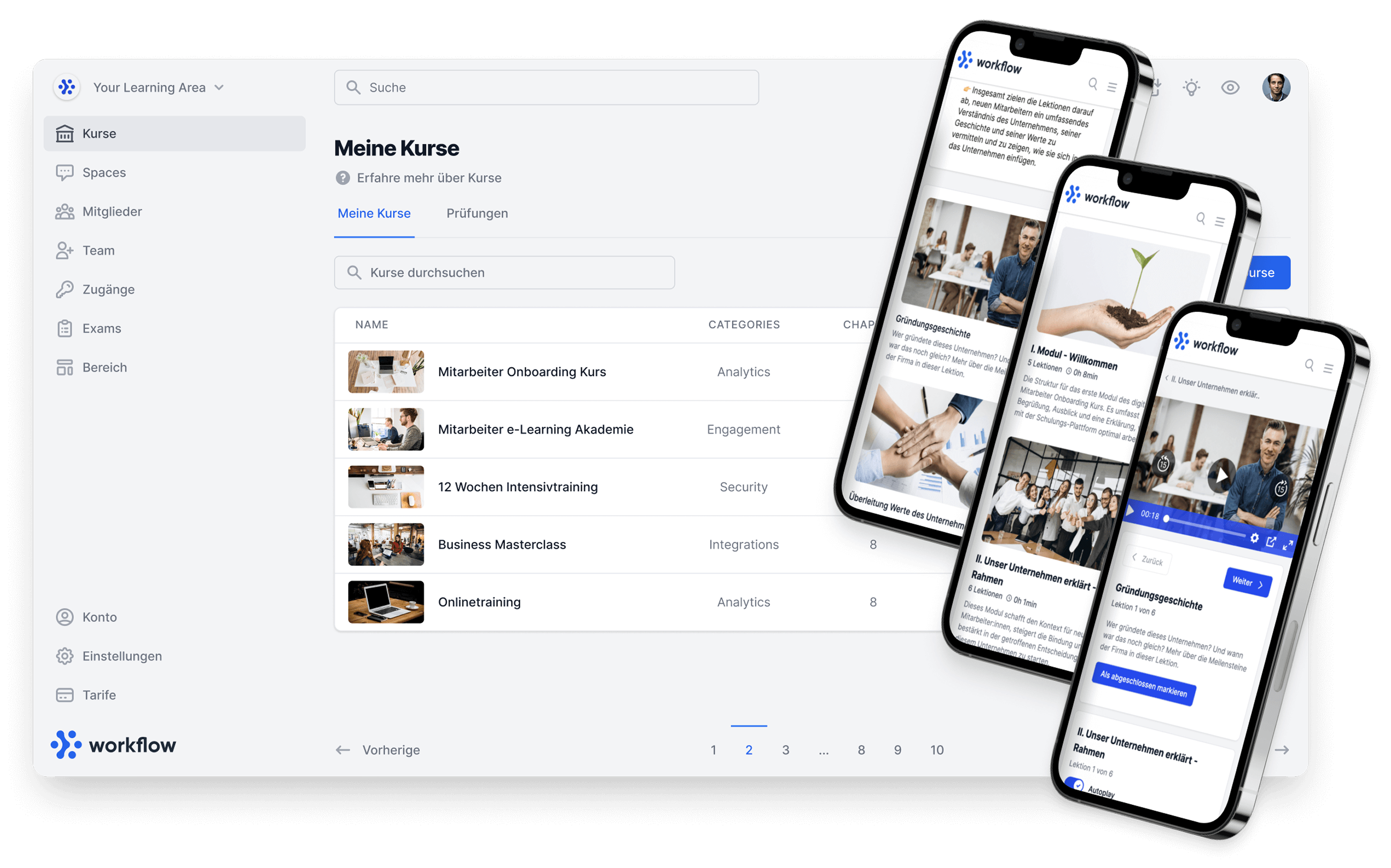The world of work is changing rapidly. Digitalization, a shortage of skilled workers and the desire for flexibility are forcing companies to rethink their training strategies. Traditional formats such as face-to-face seminars or simple e-learning courses are often no longer sufficient. They are expensive, inflexible and not very motivating - exactly the opposite of what employees and companies need today.
But further training is no longer a "nice to have". It is a strategic tool for building skills in a targeted manner, strengthening innovative power and retaining employees in the long term. Companies that neglect further training risk falling behind in the competition for the best talent.
The key question is: how can further training be designed to be efficient, flexible and motivating at the same time? The answer is obvious: e-learning.
Challenges in traditional personnel development
Traditional training formats such as face-to-face seminars are increasingly reaching their limits. Not only are they expensive and involve a great deal of organizational effort, but they also disrupt the workflow considerably. Employees have to be released from work for longer periods of time. This reduces productivity - a challenge for many companies.
Another problem is the lack of individualization. Standardized content often fails to meet the needs of the participants. The result: over- or underchallenging, which reduces motivation and learning success. What is learned often remains theoretical and is not applied in everyday working life - a missed opportunity for companies.
In addition, employees' expectations have changed. Younger generations in particular, such as millennials, attach great importance to modern, flexible training opportunities.
Companies that do not offer innovative learning opportunities risk losing their attractiveness. It is time for a change. Flexible and motivating learning approaches are now in demand. They should serve both the employees and the company's goals.

The solution: Current trends in e-learning
E-learning has established itself as a future-oriented solution that is overtaking traditional training. It offers flexibility, efficiency and the ability to customize content. The most important trends in e-learning include:
- Microlearning: learning in small, easily digestible units that can be seamlessly integrated into everyday working life.
- Personalized learning paths: Customized content tailored to the individual goals and strengths of employees.
- Social learning: promoting knowledge sharing and teamwork through interactive platforms.
- Mobile learning: training that is possible anytime and anywhere - perfect for flexible working models.
- Learning Analytics: Data-based insights into learning progress in order to continuously optimize training programs.
Studies show that digital learning methods increase employee satisfaction and promote the competitiveness of companies. With the right tools and strategies, further training becomes a real driver of success.
Why your company benefits from e-learning
E-learning is far more than just a modern trend. It is a game changer for personnel development. The advantages of digital training are manifold. They affect both the efficiency of learning processes and the motivation and satisfaction of employees.
Here are some key reasons why your company will benefit from e-learning:
1. cost efficiency
Classroom training is expensive. E-learning saves these costs as content is provided digitally. Learning content can be created once and used as often as required. Content can be updated at any time so that your company is always up to date.
2. flexibility: learning when and where it suits 🕒
E-learning enables your employees to integrate further training into their personal schedule. Whether in the office, working from home or on the move - digital learning platforms such as Memberspot offer access to training content regardless of time and place.
This reduces the need to interrupt work processes for training and therefore increases productivity. Employees can learn at their own pace, which is ideal for different learning speeds.
3. customization: tailor-made learning content for more relevance 🎯
Every employee has different learning needs and professional requirements. With e-learning, you can create personalized learning paths. These are tailored precisely to the individual skills of your employees. Their personal goals are also taken into account.
This individualization increases the relevance of the content, which in turn boosts motivation and learning success. Employees no longer learn "off the peg". Instead, they receive exactly the knowledge they need. This enables them to do their work better in a targeted manner.
4. employee retention: Modern training as a competitive advantage 🤝
In a world of work where skilled workers are becoming increasingly scarce, retaining employees is crucial. Studies show that 76%1 of millennials consider training opportunities to be one of the most important factors when choosing their employer.
By providing modern, flexible and digital learning opportunities, you signal to your employees that their development is valued. This strengthens your company's loyalty and position as an attractive employer.
5. increase productivity through practice-oriented learning 🚀
E-learning focuses on practice-oriented content that facilitates direct transfer into everyday working life. Interactive modules, realistic scenarios and short learning units ensure that what has been learned can be applied quickly.
Traditional training courses often only impart theoretical knowledge. E-learning goes one step further. It helps to overcome specific challenges in day-to-day work, increasing efficiency and helping to reduce errors.

6. scalability: training for teams of all sizes 🌐
E-learning is scalable and suitable for both small teams and global organizations. With digital platforms, you can train large groups of employees at the same time. It's easy, even if they work in different offices or countries.
This not only saves time. It also ensures that all employees have the same level of knowledge. This is particularly important for compliance training or the introduction of new technologies.
7. measurability: track learning success in real time 📊
A major advantage of e-learning is the ability to precisely track employees' learning progress. Tools such as learning analytics provide valuable data, for example on completion rates, learning times and quiz results.
This data helps HR teams to evaluate the success of training courses and optimize them in a targeted manner. You can recognize which content is well received.
You can also see where adjustments need to be made. This is a decisive advantage over traditional training courses. Measuring success there is often difficult.
8. sustainability: learning that lasts 🌱
Traditional training courses often struggle with the "forgetting" effect. Studies show that up to around 80%2 of what is learned is quickly lost.
Without regular repetition, this usually happens within a few days.e-learning solves this problem through continuous refresher courses and microlearning approaches. Employees can access content at any time and refresh their knowledge as required. This ensures that what has been learned is remembered in the long term and applied in everyday working life.
9. promoting innovation through continuous learning 💡
Further training is the key to your company's innovative strength. Employees who continuously acquire new knowledge contribute fresh ideas and drive innovation.
With e-learning, you can react quickly to new technologies, market requirements or internal changes. You can adapt training content flexibly. This keeps your team up to date at all times. This is a decisive advantage in a dynamic business world.

Your path to successful further training
E-learning is the solution for companies that want to hold their own in a changing world of work. It is flexible, scalable and customizable - and it shows your employees that you are investing in their development.
But how do you implement these approaches successfully? Which tools and methods offer the best results?
Discover more: Your guide to the HR development of the future 📘
The white paper "E-learning: the key to modern personnel development" provides you with all the answers. Learn more:
- How to replace traditional training formats with modern e-learning solutions.
- Which current trends such as microlearning or learning analytics will advance your company.
- How to increase employee satisfaction with flexible and motivating learning approaches.
- Why e-learning is not only efficient, but also cost-saving.
Start using the potential of e-learning in your company now! Download our white paper and find out how to future-proof your HR development - for motivated employees and sustainable business success.
👉 Download the white paper now and get started!
Enjoy reading our white paper. 📚
Best regards
Your Memberspot Team 👋🏽
1 https://www.gallup.com/workplace/238073/millennials-work-live.aspx
2 https://www.neuronation.com/science/de/die-vergessenskurve-nach-dr-ebbinghaus/










